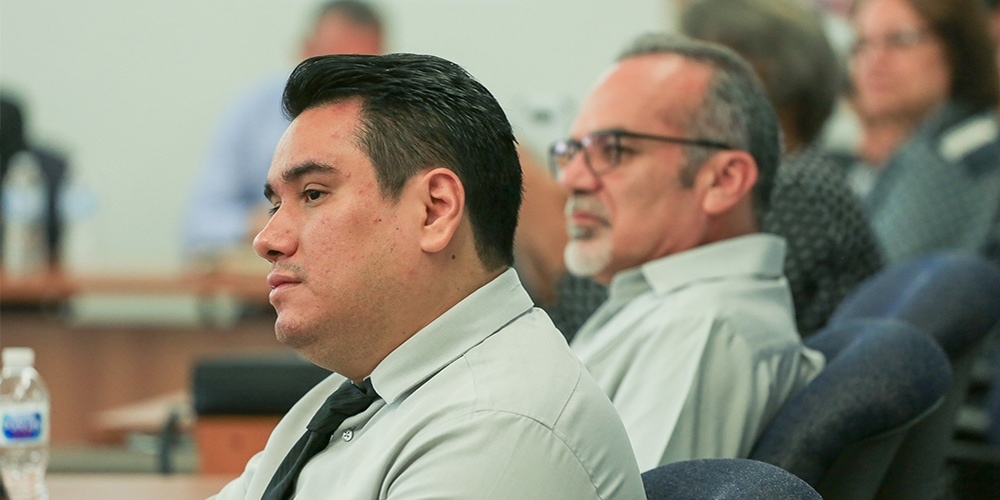
Top Seventh-day Adventist educators from the Inter-American Division (IAD) region met recently to discuss how to better care for students’ spiritual, physical, and emotional needs across hundreds of Adventist primary and secondary schools. Two dozen leaders discussed current challenges and plans during the two-day meeting held in Miami, Florida, United States, October 14-15, 2019.
“Our schools have faced many challenges, and it is important we move forward with plans to ensure we provide inclusive education to any student that enters our schools regardless of their special needs,” said Gamaliel Florez, education director for the church in IAD. The meetings are part of the annual “Paths to Knowledge” strategic sessions intended to improve educational institutions across Inter-America.
Currently, 955 church-run primary and secondary schools are filled with more than 167,000 students throughout the IAD. To ensure inclusive education takes place at every school is going to be a large task, but one that church educators agree must take place, education leaders said.
Pledge to Offer Inclusive Education
Faye Patterson, the IAD associate education director who oversees Adventist education for primary and secondary schools across the territory, said that creating awareness for inclusive education has already started at every union level. Now it has to translate to the hundreds of schools operated by the church in its respective regions.
“We have students who learn differently, who have physical challenges, and special needs, so we must meet their needs in the classroom and the school in general,” Patterson said. Adventist schools are growing every day, and many of their campuses lack proper ramps or elevator access to second- or third-level classrooms for students with physical challenges.
“Teachers must identify learning disabilities and reach students who need special education,” Patterson said.
A New Book Resource
To assist in that process across the territory, the education department has published a book designed to provide teachers with knowledge about students with special conditions and also to teach practical techniques to help them be more efficient educators.
The book, entitled We Care for All God’s Children, describes the most common conditions that teachers face daily in their classrooms. It also presents helpful teaching strategies for class planning and other activities to better serve all students, regardless of their conditions, according to Patterson, who wrote the book.
“With proper attention, all students can achieve a successful, happy, and fulfilled life,” Patterson said. That’s the goal, she added, so teachers will be better able to identify and address Attention Deficit Disorder, dyslexia, spectrum autism, vision impairment, and more.
In 1992, the Ministry of Education in Costa Rica signed an agreement which mandates that all schools have inclusive education, including five Adventist schools. More than two decades later, these schools continue to grow in catering to students with all kinds of needs, Patterson said. The Adventist schools in Costa Rica have two psychologists on rotation to counsel students and refer them to additional assistance as needed.
“The work now and ahead in Inter-America is all about training and working with teachers, students, and their parents to better provide the teaching for all students to really absorb,” she said.
The new book, produced by the Inter-American Division Publishing Association (IADPA), is free to all primary and secondary teachers in the IAD. IADPA is scheduled to distribute 6,000 copies in the 24 union regions in the territory in English, Spanish, and French.
Plan for Chaplains in Adventist Schools
Another need that education directors will address more carefully is ensuring chaplains are trained and available in schools. “Some schools have pastors functioning as chaplains at some of the church schools, but many need proper chaplaincy training at all levels from primary to university level,” Florez said.
About 300 certified chaplains are already serving at schools, but hundreds more are needed in the division’s nearly 1,000 educational institutions, he added. Pay also needs to match the ministry of the chaplain at Adventist schools.
The Adventist school system in the Dominican Republic has employed district chaplains for three years now, catering to students across the 81 primary and secondary schools on the island, Flórez reported. The North Mexican Union has also been successful in providing chaplains to its 54 primary and secondary schools.
“The chaplain’s work is about strengthening and teaching spiritual development to students and their families, whether these are church members or not,” Flórez said.
The inclusive education strategy for schools and institutions also includes addressing needs with the support of psychologists, counselors, and mental health professionals, he explained.
“We continue to encourage our union education leaders to evaluate and adapt to the needs in their schools across their territories,” Flórez said.
The original version of this story was posted on the Inter-American Division news site.